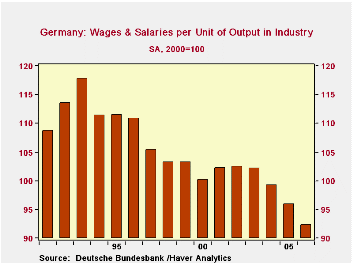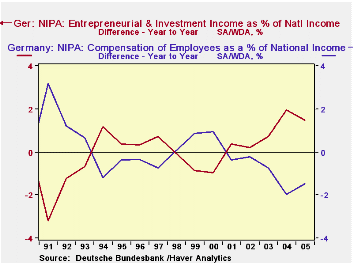 Global| Feb 19 2007
Global| Feb 19 2007German Labor Demanding Big Increase in Wages
Summary
IG Metall, the powerful metal workers' union in Germany, has announced that it will seek a 6% increase in wages when negotiations begin in next month. Haver's GERMAN Database contains a number of series that may provide background for [...]

IG Metall, the powerful metal workers' union in Germany, has announced that it will seek a 6% increase in wages when negotiations begin in next month. Haver's GERMAN Database contains a number of series that may provide background for appraising labor's demands. In the Employment, Earning, Productivity and Costs section, among others, there are indexes based on 2000=100 for wages and salaries per worker, per working hour, per unit of output and per unit of turnover. In addition indexes are available for productivity. In the National Accounts section, the shares of labor income and entrepreneurial, investment and property income in National Income are given.
Wage per hour increases in Germany have been subdued over the past four years. During this time the annual increases in the index of German wages and salaries per hour have been between 1.15% and 1.84%. This has been the longest period of such low growth since the country was reunited in 1991 as can be seen in the first chart.
At the same time that labor compensation has experienced slow growth, productivity has shown good growth with the result that unit labor costs have declined sharply as can be seen in the second chart. The decline in unit labor costs, in turn, has resulted in a growing share of total national income going to entrepreneurial, investment and property income. The third chart compares the annual gains and losses of the two shares of income. Since the shares add up to 100%, what one gains, the other loses. Labor has lost share in most years with the result that its share has declined to 67.9% in 2005, from 72.9% in 1993, the post unification peak. At the same time, the share of capital income has risen from 27.1% to 32.6%. These trends have continued into 2006 where the average for the first three quarters of the year show a 66.3% share for labor income and a 33.7% share for capital income.
| GERMANY | 2006 | 2005 | 2004 | 2003 | 2002 | 2001 | 2000 |
|---|---|---|---|---|---|---|---|
| Wages & Salaries per Working Hour (% Chg) | 1.15 | 1.20 | 1.84 | 1.44 | 3.09 | 3.27 | 2.91 |
| Productivity (% Chg) | 5.18 | 4.66 | 4.70 | 1.83 | 2.82 | 1.23 | 5.99 |
| Unit Labor Cost (% Chg) | -3.85 | -3.29 | -2.76 | -0.37 | -0.25 | 2.01 | -2.92 |
| Labor Share in National Income (%) | 66.3* | 67.4 | 68.9 | 40.9 | 71.6 | 71.8 | 72.2 |
| Capital Share in National Income (%) | 33.7* | 32.6 | 31.1 | 27.1 | 28.4 | 28.2 | 27.8 |
More Economy in Brief
 Global| Feb 05 2026
Global| Feb 05 2026Charts of the Week: Balanced Policy, Resilient Data and AI Narratives
by:Andrew Cates





